US Concerned Over Iran’s Mass Arrests, Sham Trials, Death Sentences
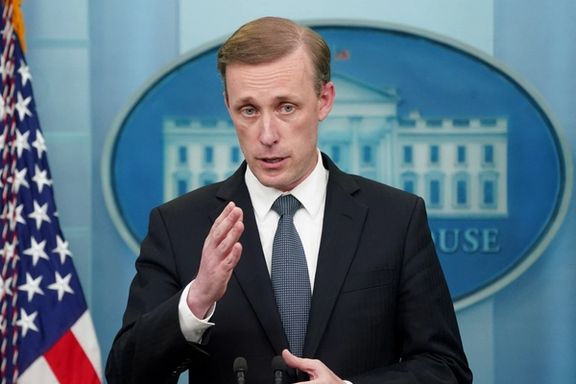
The United States reiterated concerns Monday over Islamic Republic’s crackdown on dissent as well as systematic denial of basic dignity and freedom of Iranians.

The United States reiterated concerns Monday over Islamic Republic’s crackdown on dissent as well as systematic denial of basic dignity and freedom of Iranians.
In a statement by National Security Advisor Jake Sullivan, the White House expressed deep concerns about Islamic Republic’s mass arrests, sham trials, and the impending death sentence for protesters voicing legitimate demands against “a government that systematically denies basic dignity and freedom to its people.”
“The eyes of the world are on Iran,” he said, stressing that “The human rights abuses inflicted by its government must not go without consequence.”
He also welcomed new set of sanctions by the European Union and the UK over its bloody crackdown on protests, underway since the death in custody of 22-year-old Mahsa Amini mid-September, saying that the United States, standing with our partners and allies around the world, staunchly supports Iranian people and their demands. The US will continue to pursue accountability for those responsible for these abuses through sanctions and other means, he added.
Mentioning Iranian dissident blogger Hossein Ronaghi, who was transferred temporarily from Evin prison to hospital after reports of torture, Sullivan said, “The torture and mistreatment of political prisoners like Mr. Ronaghi must cease.”
Tehran residents rushed to a hospital Sunday night as news emerged that Ronaghi had been taken there in a critical condition. Ronaghi who has been on hunger strike since his arrest on September 24, has refused liquid nourishment and water since Saturday.
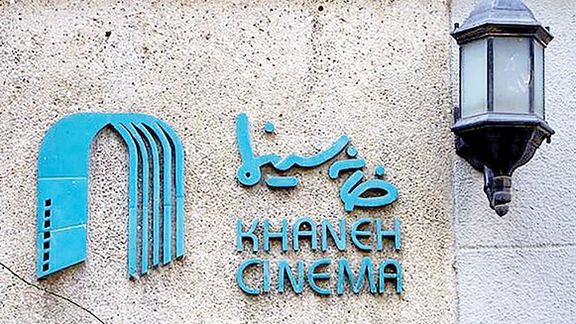
Tens of artists in Iranian cinema, theater, and music industry have been banned from working or leaving the country over their support for antigovernment protests.
In an article published by reformist Shargh daily on Monday, Iran’s House of Cinema, formerly known as the Iranian Alliance of Motion Picture Guilds, said it has prepared a list of 100 filmmakers as well as other movie, music and theater personalities who have been either arrested or banned from work.
The paper said the list was made in collaboration with Iran’s Theater Forum and Iran’s Music House but was not released due to safety reasons. However, it said that documentary maker Mozhgan Ilanlou and actress Katayoun Riahi were among those who are currently under arrest, adding that the detained artists are being held in Evin and other prisons around Tehran, as well as in Tabriz and Sanandaj prisons.
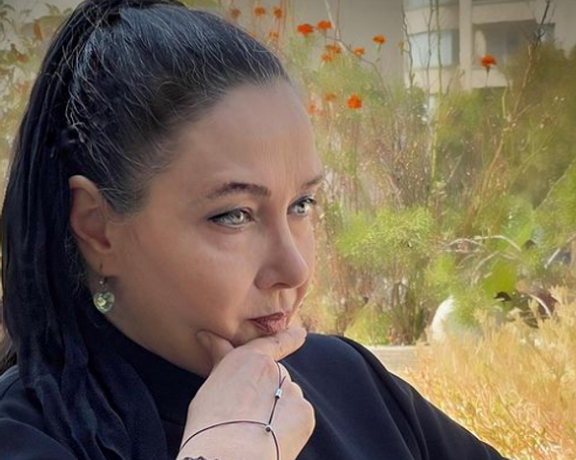
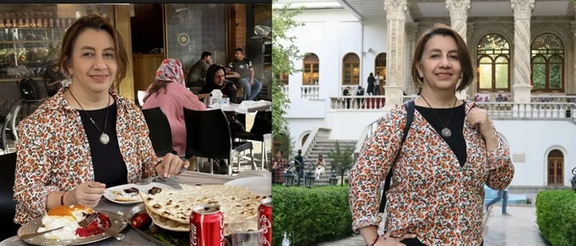
According to Shargh, a 10-member taskforce has been set up to keep a list of measures against artists and follow up on their whereabouts. One of its members, Mehdi Kouhian, himself a producer and a legal expert, said that there is no exact data about the number of arrested or banned artists because the authorities do not publicly announce such things. He added that the recent detainees either protested online or took part in street rallies.
According to the article, during the past few months “most famous actors and directors" have been banned from working and some of their contracts were terminated while they were working on projects.
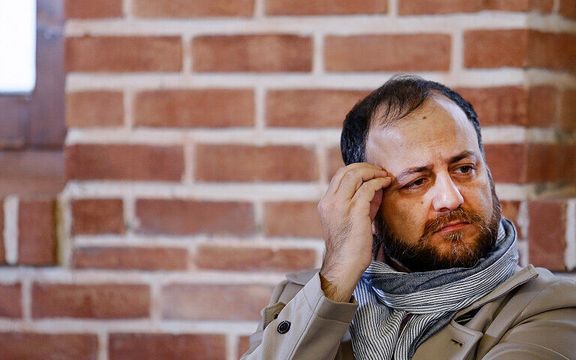
No matter how big the list of banned or arrested artists is, the list of celebrities who are expressing support for the uprising is bigger. Every day, more and more Iranian actresses and athletes are appearing in public or posting photos of themselves without the Islamic Republic’s mandatory hijab as a show of solidarity, while many male artists voice their support verbally or by participating in protest gatherings.

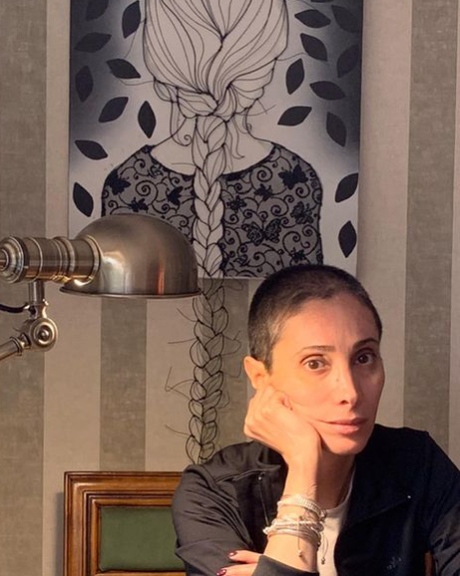
However, Supreme Leader Ali Khamenei, called such acts of support "worthless" in a speech last month and asked the judiciary to deal with them.
Even before the current wave of protests began in mid-September, the Ministry of Culture and Islamic Guidance had started cracking down on filmmakers and artists who were critical of the regime. About a month before the start of protests, Mohammad Khazaei, the head of the Cinema department of the ministry spoke of a list of banned filmmakers and actors for various reasons. In recent decades, such a list has always existed, but it was the first time that a high-ranking official publicly talked about it.
In August, Culture Minister Mohammad Mahdi Esmaili defended banning artists and once again threatened them to stop “working against the national interests" of the Islamic Republic.
On Saturday, imprisoned filmmakers Jafar Panahi and Mohammad Rasoulof issued a statement from Evin Prison warning about serious deterioration of dissident blogger Hossein Ronaghi’s health who was on a hunger strike in the past 50 days before being transferred to hospital on Sunday.
In July, Iran’s judiciary said award-winning film director Jafar Panahi was sent to Evin prison to serve his six-year sentence. Panahi, who has won numerous awards, including the Golden Leopard at Locarno Festival, the Golden Lion in Venice, and the Silver Bear at the Berlinale, was arrested earlier as he was protesting the detention of two other award-winning filmmakers Mohammad Rasoulof and Mostafa Alehahmad.
Rasoulof – another prominent filmmaker with several international awards such as the Golden Bear – and Alehahmad – who is known in international film galas for his short works -- were arrested July 8 as part of the Iranian crackdown on the signatories of a collective statement titled “Lay down the gun” issued by more than 100 film industry personalities at the end of May.
The statement had called on military and security forces who “have become tools for cracking down on the people,” not to suppress protesters during a wave of protests across Iran that were triggered when a 10-story building collapsed in Abadan, leaving at least 40 people dead and dozens missing.
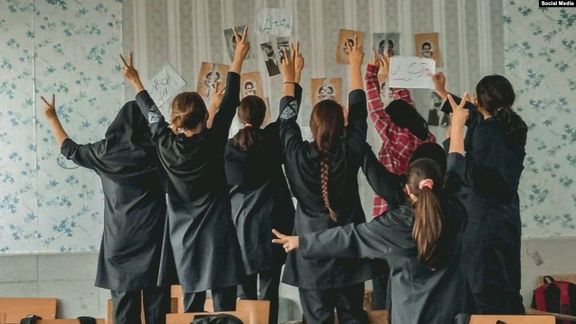
Leading reformist figures in Iran have recently made statements that reveals their interest in preserving the status quo despite popular protests aimed at changing the political system.
In several articles over the past weeks, reformist commentators expressed concern that the situation is going toward a revolution while they claimed the nation wanted only to reform the system and warned that a dramatic change may lead to undesirable uncertainty.
On November 14, two reform figures, former President Mohammad Khatami and former vice president Massoumeh Ebtekar broke their silence after more than 8 weeks about a possible demise of the regime and voiced their opposition to dramatic changes in the Iranian political system.
Khatami, revealed his opposition to regime change by saying that it was "neither possible, nor desirable." Nonetheless, he warned that if the current state of affairs continues, the ground is paved for a looming social collapse.
Khatami called on the regime "to reform itself," but at the same time acknowledged that "a large part of the society shares the protesters' dissatisfaction" of the current political system.
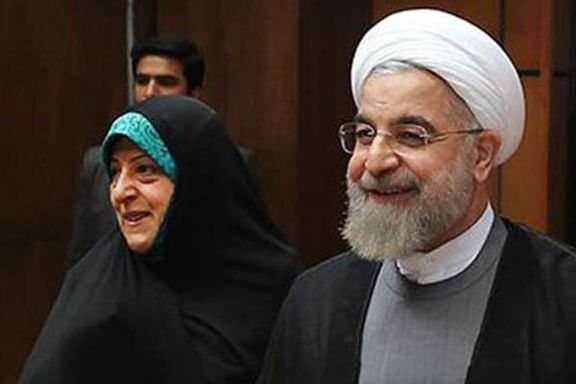
On the same day, Ebtekar said in a commentary in the reformist daily Etemad in Tehran, "The new generation of Iranians believes it is not only the Iranian government, but the entire Iranian political system that is inefficient."
She added, "The Iranian government has been lagging behind the society for several years now. By not recognizing natural social developments, the Iranian government has created the current crisis for itself."
Ebtekar said elsewhere in her commentary: "the Iranian state television and other organizations with hefty government budgets which are responsible for keeping the public informed have failed to listen to young Iranians and their demands." She added that "Unfortunately, many religious and propaganda organizations deny the pluralism that exists in Iranian society and wish to dictate whatever that serves their interests."
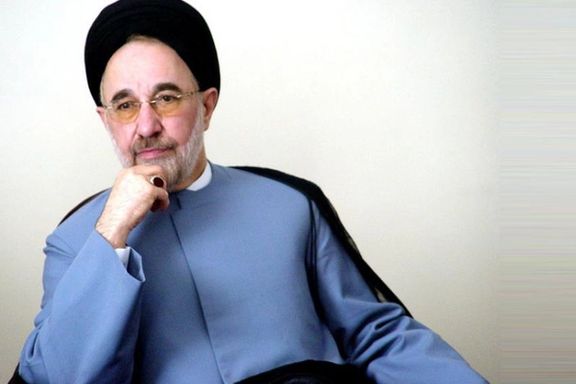
The new generation that has grown up with the Internet and social media, believes to be a citizen of the world and cannot tolerate the traditional guidelines, Ebtekar said, adding that this has created a generational gap in Iran.
In an article carried by Etemad newspaper, Iranian American author and sociologist Asef Bayat wrote in a response to reformist commentator Abbas Abdi who had opposed regime change and expressed concern that the current protests might lead to a tragic end for Iranian society, "The tragedy of reformism in Iran is that Iranian reformists cannot further any reforms because they have been pushed out of the power circle, and at the same time they cannot agree with radical changes in Iran because by definition they are reformers and not revolutionaries."
Bayat wrote that "individuals like Abdi fear the cost of a revolution. They fear violence, instability and damage to the country's infrastructure. Ordinary people are also afraid of the cost of a revolution, but they risk everything when they see that all roads to reform are blocked.
"However, some people talk about the risks involved in a revolution as though the current situation is risk-free like a paradise," Bayat said adding that the costs of the current situation include an average 20 percent inflation, high unemployment particularly among educated Iranians, high recession in the 2010s, the collapse of the middle class and pushing 45 percent of the population under the poverty line, destruction of the country's environment and many of its villages, and the decline of Iranians' status in the world because of the government's adventurist policies.
Bayat argued that Mahsa Amini, the young woman murdered in custody of morality police, the workers in Assalouyeh oil and gas fields and millions of Iranian men and women are being constantly humiliated, losing their hopes and their lives. But those who have chosen not to submit to this gradual death have taken collective action to change the status quo.

Britain has slapped a new round of sanctions on 24 Iranian officials who played a role in cracking down on protests after the death of Mahsa Amini in police custody.
In a press release on Monday the United Kingdom announced the “sanctions target officials within the Iranian regime who are responsible for heinous human rights violations.”
British Foreign Secretary James Cleverly stated that by these sanctions the UK and its partners have sent a “clear message” to the Iranian regime that “the violent crackdown on protests must stop and freedom of expression must be respected.”
The Foreign Secretary expressed that Britain designates Iran’s Communications Minister Issa Zarepour as well as a number of law enforcement agents and IRGC officials who ordered and been involved in the clampdown on demonstrators.
The British foreign office further noted that Chief of Iran’s Cyber Police, Vahid Mohammad Naser Majid, will be targeted due to the internet shutdown and “disabling WhatsApp and Instagram, and banning the use of the Google Play app and virtual private networks (VPNs).”
Governor of Sistan and Baluchestan as well as Kordestan have also been sanctioned due to massacre of 80 people on September 30 in Zahedan and heavy crackdown on Kurdish protesters.
The name of Chief of Tehran Police could also be seen in the list. Hossein Rahimi is sanctioned for using live rounds and tear gas against students at Sharif University in Tehran.
The sanctions include asset freezes and travel bans.
Meanwhile, the European Union also approved a new round of sanctions Monday against 29 individuals and three entities with asset freezes and travel bans.
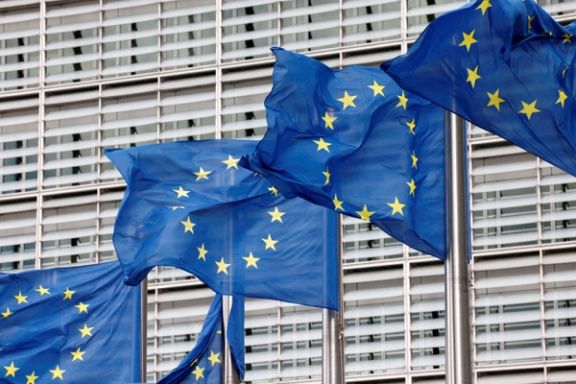
The European Union sanctioned 29 Iranians and three entities Monday over what it said was human rights violations related to suppression of ongoing protests.
A statement issued in Brussels, where foreign ministers met, said the move was over “their role in the death of Mahsa Amini and the violent response to the recent demonstrations in Iran.”
Among the 29 named were Enayatollah Rafiei, Ali Enayatollah, Fatemeh Ghorban-Hosseini, and Parastou Safari, who the EU said were the “squad that arbitrarily arrested” Amini, who died September 16 after receiving fatal head blows in custody of Tehran ‘morality police.’
Also sanctioned, for “their role in the brutal repression of the recent protests,” were Iran’s Minister of Interior Ahmad Vahidi, Major-General Hossein Salami, commander of the Islamic Revolutionary Guards Corps (IRGC), and Brigadier General Major-General Kiumars Haydari, commander of the army’s ground forces. Added to the list were several provincial heads of the Iranian Law Enforcement Forces (LEF) and Basij, mainly in the majority-Sunni Kurdish and Baluchi regions where most unrest and violence have occurred.
Press TV, the English-language state television station, was designated “for producing and broadcasting the forced confessions of detainees,” along with Vahid Mohammad Naser Majid, head of the cyber-police, and the Bonyad-eh Taavon-eh Basij, a cooperative foundation linked to the Basij.
The measures involve a ban on entering the EU, the seizure of any assets in the EU, and a prohibition on EU citizens or businesses making funds available to those designated. The EU statement said it had now listed 126 people and 11 entities over human rights violations in Iran.
The “use of force against peaceful protestors” was “unjustifiable and unacceptable,” the EU said, as “people in Iran, as anywhere else, have the right to peacefully protest…” The statement called for the death of Amini to be “investigated in an independent and transparent manner and any[one] proved responsible for her death…held accountable.”
‘A clear message’
Germany’s Foreign Minister Annalena Baerbock told reporters that the new sanctions would “send a clear message to those who think they can suppress, intimidate and kill their own people without consequences.”
EU-Iran relations have soured in recent months, with European leaders vocal both over protests in Iran and Russia’s use of Iranian-made drones in Ukraine. French President Monday spoke Monday of a ‘new framework’ for regional security given the continuing failure of 18-month talks to revive the 2015 Iran nuclear agreement, the JCPOA (Joint Comprehensive Plan of Action).
As a further sign of the ‘E3’ signatories of the JCPOA – France, Germany, and the United Kingdom – moving closer to the US, the E3 is preparing a second resolution, following one in June, at this week’s quarterly board of the International Atomic Energy Agency (IAEA) condemning Iran over what the IAEA has said is a lack of cooperation with the agency.
Iran’s foreign affairs spokesman Nasser Kanaani said Monday the US and E3 were “again trying to use the agency politically and turn it into a vehicle for political pressure on the Islamic Republic of Iran.” Kanaani pointed to the scheduled visit this month of IAEA officials to discuss the outstanding issue of uranium traces found in sites linked to Tehran’s pre-2003 nuclear work, but US State Department Spokesman Ned Price last week said Iran was “foot-dragging.”
The UK also Monday announced new sanctions against Iran over “violent repression of protests.” Those named included cyber-police chief Majid, and the Communications Minister Issa Zarepour.

Many are criticizing Iran’s Sunni leader Molavi Abdolhamid for meeting with the Ali Khamenei's envoy despite the killing of many protesters in his native region.
“Molavi Abdolhamid made the greatest mistake if he met with Khamenei’s envoy. It’s totally unacceptable,” one of the many who criticized Abdolhamid for meeting with Mohammad-Javad Haj-Aliakbari tweeted before local sources confirmed that the meeting had taken place.
“Tell him they [security forces] were busy arresting Baluchis while he was speaking with Khamenei’s envoy. They killed two people for no reason just yesterday,” another twitterati retorted.
Molavi Abdolhamid, the leader of Iran’s largely Sunni Baluch population in the southeastern province of Sistan and Baluchestan and other local Sunni leaders met with Haj-Aliakbari and his accompanying delegation at the private residence of a local community leader in Zahedan Sunday.
State media said Haj-Ali Akbari was carrying “Supreme Leader’s greetings to the people of Sistan and Baluchestan” and to let them know that the recent events in the province have “saddened and upset him”.
However, what some media in Tehran reported about Haj-Ali Akbari’s statements, showed that his remarks had double meaning. At the same time that he spoke about resolving misunderstandings, he also said that he delivered “serious messages to Some” to be careful about their behavior.
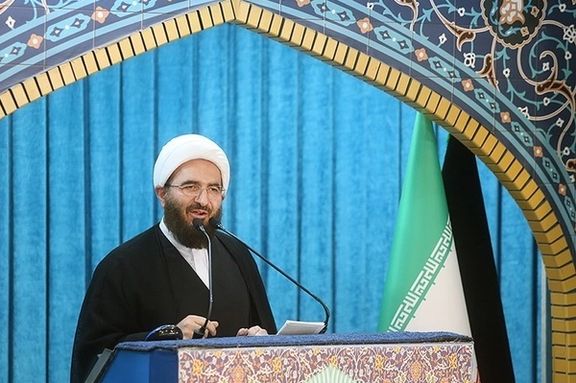
Abdolhamid has strongly criticized the authorities and said he holds Khamenei responsible for the violence against Sunni Baluchis and other protesters.
Haj Aliakbari who is one of Tehran’s interim Friday imams also heads the Policymaking Council of Prayer Leaders which sets the agenda for state-sponsored Friday sermons across the country.
Amnesty International said on November 10 it had recorded the names of at least 100 protesters and bystanders including sixteen children who were killed by security forces in Sistan and Baluchestan Province since September 30 but believes the real number is much higher.
Official media say four Revolutionary Guards (IRGC) forces as well as 35 protesters and bystanders were killed in Zahedan on September 30.
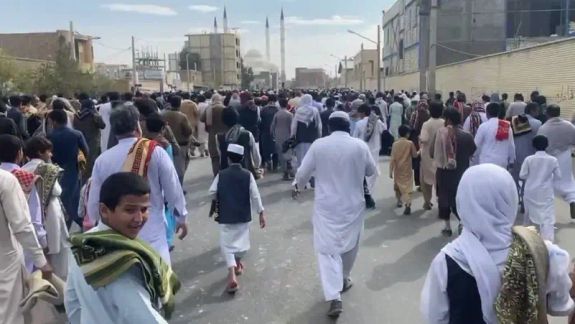
According to his official website, Abdolhamid said in the meeting with Khamenei’s envoy that the recent events were the outcome of “discrimination against the Sunni community”.
He added that on September 30, the deadliest day of the crackdown on protesters, security forces had fired live ammunition at peaceful protesters in Zahedan and insisted that the attack was unprovoked. Protesters who threw stones at a police station before they were shot did not intend to seize the station and there were no militants amongst them as claimed by the authorities, he said.
The IRGC-linked media called the killing of protesters in Zahedan, widely referred to as “Bloody Friday” on social media, “a terrorist plot” and blamed Jaish ul-Adl Salafi jihadist group, but the group denied any responsibility.
“If these claims were true at least several security forces would have been killed or wounded [during the September 30 crackdown]. But around 100 ordinary people were shot dead inside the prayer grounds and the bullets mainly hit their heads and chests.”
He also pointed out that security forces had fired live ammunition at protesters who were pelting the local governor’s office in Khash, another city in the Baluch part of the province on November 4.At least 18 protesters and bystanders, including two children, were killed in Khash.
Referring to security forces killed in the restive province in the past few weeks, Haj-Aliakbari lauded “security-defending martyrs” in his meeting with Abolhamid and other local leaders but also said Khamenei considers the locals who were killed “innocently, as a result of human error, or in other ways” as “martyrs”.
Khamenei’s envoy also said those arrested “whose crimes were small” will soon be pardoned by Khamenei but others will be dealt with “justly and decisively … so that such incidents won’t happen again” and blamed “those outside the country” for taking advantage of the situation in the restive province and accusing the people of the province of “separatism”.